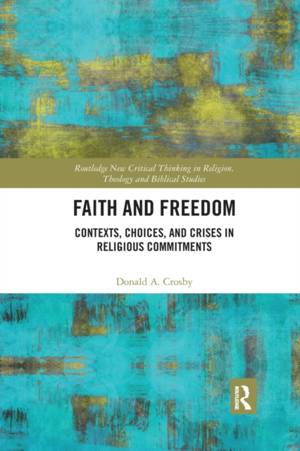
- Retrait gratuit dans votre magasin Club
- 7.000.000 titres dans notre catalogue
- Payer en toute sécurité
- Toujours un magasin près de chez vous
- Retrait gratuit dans votre magasin Club
- 7.000.000 titres dans notre catalogue
- Payer en toute sécurité
- Toujours un magasin près de chez vous
Description
It is sometimes thought that individual religious faith should be firmly fixed in the traditions of the past. That once it is established in someone's life, it should remain steadfast and unchanging throughout personal, cultural, or any other changes. This book subverts that idea by showing how it is actually ongoing inquiry, examination, and indeed change, requiring similarly ongoing acts of informed and responsible freedom, that will produce a dynamic and meaningful faith.
Contending that religious faith should readily encompass deliberate and ongoing acts of personal freedom, the text outlines various ways in which these dual aspects are more ally than enemy. It also demonstrates how the ongoing free choices that are required for genuine faith are not absolute, but are in fact contextualized and conditioned by genetic makeup, environmental conditioning, and present character traits produced in part by a person's past choices. Despite this caveat, personal freedom is presented as genuine and real, with a vitally important role to play in a person's religiosity. The book concludes with some observations of this process in practice in the author's own journey from a Christian theist worldview to that of a religious naturalist.
This is a fascinating treatise on the role of personal freedom in religious faith. It will, therefore, be of significant interest to scholars of religion, theology, philosophy of religion and religious naturalism.
Spécifications
Parties prenantes
- Auteur(s) :
- Editeur:
Contenu
- Nombre de pages :
- 148
- Langue:
- Anglais
- Collection :
Caractéristiques
- EAN:
- 9780367590406
- Date de parution :
- 14-08-20
- Format:
- Livre broché
- Format numérique:
- Trade paperback (VS)
- Dimensions :
- 150 mm x 231 mm
- Poids :
- 235 g







